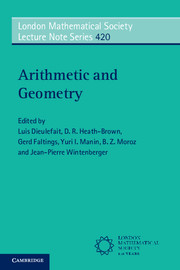Book contents
- Frontmatter
- Contents
- Preface
- Introduction
- List of participants
- Trimester Seminar
- Workshop on Serre's conjecture
- The research conference
- 1 Galois groups of local fields, Lie algebras and ramification
- 2 A characterisation of ordinary modular eigenforms with CM
- 3 Selmer complexes and p-adic Hodge theory
- 4 A survey of applications of the circle method to rational points
- 5 Arithmetic differential equations of Painlevé VI type
- 6 Differential calculus with integers
- 7 Un calcul de groupe de Brauer et une application arithmétique
- 8 Connectedness of Hecke algebras and the Rayuela conjecture: a path to functoriality and modularity
- 9 Big image of Galois representations and congruence ideals
- 10 The skew-symmetric pairing on the Lubin–Tate formal module
- 11 Equations in matrix groups and algebras over number fields and rings: prolegomena to a lowbrow noncommutative Diophantine geometry
- 12 On the l-adic regulator as an ingredient of Iwasawa theory
- 13 On a counting problem for G-shtukas
- 14 Modular forms and Calabi-Yau varieties
- 15 Derivative of symmetric square p-adic L-functions via pull-back formula
- 16 Uniform bounds for rational points on cubic hypersurfaces
- 17 Descent on toric fibrations
- 18 On filtrations of vector bundles over P1Z
- 19 On the dihedral Euler characteristics of Selmer groups of Abelian varieties
- 20 CM values of higher Green's functions and regularized Petersson products
Introduction
Published online by Cambridge University Press: 05 August 2015
- Frontmatter
- Contents
- Preface
- Introduction
- List of participants
- Trimester Seminar
- Workshop on Serre's conjecture
- The research conference
- 1 Galois groups of local fields, Lie algebras and ramification
- 2 A characterisation of ordinary modular eigenforms with CM
- 3 Selmer complexes and p-adic Hodge theory
- 4 A survey of applications of the circle method to rational points
- 5 Arithmetic differential equations of Painlevé VI type
- 6 Differential calculus with integers
- 7 Un calcul de groupe de Brauer et une application arithmétique
- 8 Connectedness of Hecke algebras and the Rayuela conjecture: a path to functoriality and modularity
- 9 Big image of Galois representations and congruence ideals
- 10 The skew-symmetric pairing on the Lubin–Tate formal module
- 11 Equations in matrix groups and algebras over number fields and rings: prolegomena to a lowbrow noncommutative Diophantine geometry
- 12 On the l-adic regulator as an ingredient of Iwasawa theory
- 13 On a counting problem for G-shtukas
- 14 Modular forms and Calabi-Yau varieties
- 15 Derivative of symmetric square p-adic L-functions via pull-back formula
- 16 Uniform bounds for rational points on cubic hypersurfaces
- 17 Descent on toric fibrations
- 18 On filtrations of vector bundles over P1Z
- 19 On the dihedral Euler characteristics of Selmer groups of Abelian varieties
- 20 CM values of higher Green's functions and regularized Petersson products
Summary
The main theme of the trimester was the interplay of different methods used in modern number theory. We wish to emphasize the new results and conjectures in arithmetic geometry, having direct bearing on the classical number theoretic problems. Two sessions, on the recently proved Serre's conjecture from 15 January to 14 February (organizers: L. Dieulefait and J.-P. Wintenberger) and on counting rational points on algebraic varieties from 15 March to 14 April (organizer: D.R. Heath-Brown), as well as a couple of shorter workshops, several seminars, and mini-courses were organized. The trimester culminated in a research conference from 15 to 19 April.
The aim of the session “Serre's conjecture” was to report on recent works linked to that conjecture, in particular about Galois representations and automorphic representations. During the weeks starting on 14 January and 21 January, Henri Carayol lectured on his work on the algebraic properties of Griffiths-Schmid varieties. The Griffiths-Schmid varieties are analytic varieties classifying Hodge structures. Studying their algebraic properties might be a step towards constructing Galois representations associated to automorphic representations appearing in the cohomology of these varieties. Our secondtheme related to the recent work of Michael Harris, Kai-Wen Lan, Richard Taylor and Jack Thorne, who have constructed Galois representations associated to not necessarily self-dual automorphic representations. The proof heavily relies on p-adic properties of automorphic representations.
The aim of the session “counting rational points on algebraic varieties” was to report on recent works on the existence, frequency and distribution of rational points on algebraic varieties. Thus the main themes were local to global principles, Manin's conjecture, developments of the Hardy-Littlewood method and the determinant method.
Information
- Type
- Chapter
- Information
- Arithmetic and Geometry , pp. ixPublisher: Cambridge University PressPrint publication year: 2015
